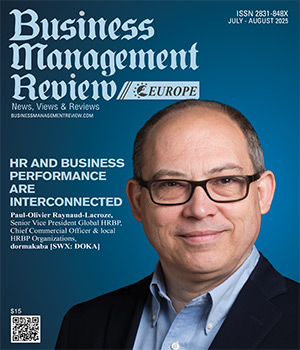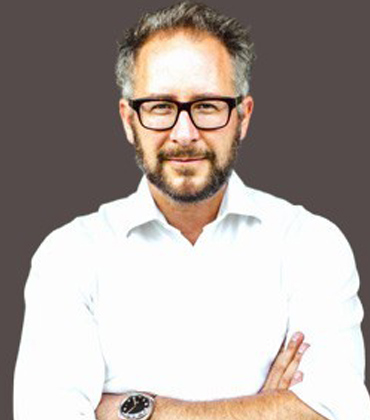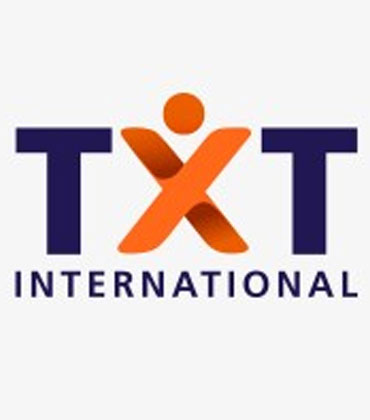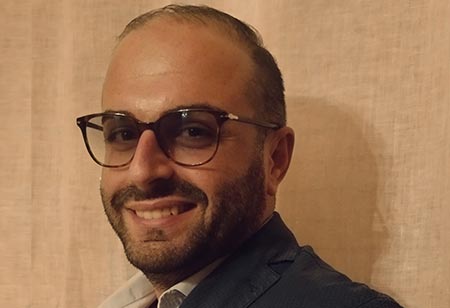Thank you for Subscribing to Business Management Review Weekly Brief
I agree We use cookies on this website to enhance your user experience. By clicking any link on this page you are giving your consent for us to set cookies. More info
Business Management Review: Speials Magazine
This article is based on an interview with Paul-Olivier Raynaud-Lacroze, senior vice president of global HRBP chief commercial officer and local HRBP organizations at dormakaba. Change in the Role and Position of the HR I mainly knew the HR function as an employee working in R&D and corporate strategy before I ventured into human resources. I'm not a technical expert in HR per se. I entered the field later and immediately added a business dimension to my role. However, this aspect depends on the company and how it views the HR department. Is it seen as a specialist in labor law and pure administrative function, or does the organization consider HR a true business partner? I don't think companies that stick to the former view, where HR is seen as purely administrative, are heading in the right direction. Developments Emphasizing More Business-Oriented Role of HR Several factors make HR management strategic. It has to do with the new generation, which is entirely different. W
Executive Coaching Provider In Europe
Hyper-complexity and accelerated change continue to define the evolving business landscape. Amid these conditions, leaders seek to surpass mere survival, driven to unlock their potential and that of their teams to truly thrive. This quest for success prompts a crucial question—how can they excel in the dynamic and demanding business ecosystem? With 30 years of coaching expertise, Trigon addresses this question through its one-year certified training course. The program fosters a symbiotic relationship between internal leaders and the external Trigon coaching team using out-of-the-box tools and psychosocial principles, empowering clients to unlock the potential of their leaders and teams. “Our training course brings together professionals from diverse backgrounds to address complex developmental challenges within client organisations,” says Johannes Narbeshuber, managing partner of Trigon. The course, held in Zurich, Cologne, Salzburg, and Vienna, attracts diverse applicants. About one-third aspire to become independent coaches. Another one-third, from HR or organisational development, seek to enhance their internal coaching capabilities. The final third, including founders and executives, aim to gain insights into promoting growth and development without pursuing a coaching career. Applicants undergo an extensive selection process to ensure the formation of a vibrant and collaborative learning community. The program is an attractive option for individuals seeking growth through structured processes and tools, embodying the philosophy of ‘learning the rules like a pro so you can break them like an artist.’ It employs a ‘systemic evolutionary’ coaching approach that combines traditional systems thinking with the innovative hypnosystemic approach and a unique perspective on lifelong personal development and growth. In systems thinking, external factors like different teams, company units, strategic situations, and the broader environment are considered. The hypno-systemic approach addresses the internal complexity of individuals from a systemic perspective. Trigon navigates the intricate interplay of these two approaches, embracing an evolutionary perspective rooted in the laws of success for human development and fulfilment. Conflict mediation is central to the coaching process. Trigon skilfully integrates business psychology and conflict management to address internal and interpersonal conflicts, steering individuals and organisations towards sustainable growth and holistic success.
Executive Search Service In Europe
In the dynamic business landscape, organisations often have to redefine their business approaches and target markets for harmonious growth. This necessitates the exploration of executive talent beyond their customary boundaries. However, the inherent unfamiliarity of the terrain presents a challenge for recruiters in precisely identifying the most fitting candidates. Giudicelli International Executive Solutions (GIES), a leadership consulting firm, plays a pivotal role in sourcing, vetting, and securing professionals equipped to thrive amidst this evolving landscape. It maintains close collaboration with clients and candidates, exhibiting proficiency domestically in France and internationally around the globe. With a deep understanding of global markets, client needs and candidate profiles, GIES helps recruiters secure ideal matches for clients and candidates. Its expertise in executive search transcends borders and guides clients to discover talents spread across countries and cultures. “We seek out executives and meet people with varied, enriching professional backgrounds while acting as the link between the recruiters and their future talent,” says Alain Giudicelli, managing partner at GIES. Proficient in executive search, assessment of managerial skills, and organisational development, Giudicelli perfectly blends best practices learned from both industry giants and nimble SMEs with his innovative strategies. This approach helps identify the right talent while offering insights into organisational restructuring and strategic development. Drawing from a broad industry span and rich experience, GIES presents candidates from varied sectors and companies, enriching the talent pool with fresh perspectives and innovative solutions that contribute to the client's competitive edge. Its seasoned team of experts with diverse backgrounds engages in internal dialogues, collectively brainstorming to outline ideal candidate profiles and their potential alignment within the organisation. At GIES, the executive search process extends beyond conventional role fulfilment. It entails attentive listening to disparate viewpoints, refining ideas, and evaluating their significance based on stakeholder perceptions. This method emphasises comprehensively understanding clients' requirements, fostering multidimensional discussions, and facilitating conversations among potential candidates to discover matches between their proficiencies and organisational needs.
Executive Search Firm In Europe
Most executive search firms, when entrusted with the crucial task of identifying the right talent, tend to rely on existing personal networks and in-person screening. This conventional methodology proves inadequate in recognising, attracting or engaging the passive talents from diverse backgrounds, which is essential for fulfilling an organisation’s hiring needs. TXT International, a boutique executive search firm, takes a different path to identify, engage and recruit the world’s best executive talent. It applies an innovative, tech-driven approach that accompanies a risk-free fee structure. Anchoring on a ‘who we can identify’ model rather than the traditional ‘who you know’ model, TXT International harnesses the power of big data and proprietary search algorithms to pinpoint exceptional candidates globally. The approach enables the firm to attract coveted passive, diverse and geographically dispersed candidates who are largely passive and often fall outside the network of traditional search firms. “We can target profiles to meet our clients’ requirements and deliver diverse candidate slates on demand,” says Tim Wilkins, co-founder and commercial director of TXT International. Increasing diversity in senior leadership teams is a priority for many organisations, and traditional retainer fee search firms often lack diverse candidates in their personal networks. Leveraging data, TXT International presents a slate of relevant and interested candidates for any position globally within five working days of engagement. This strategic approach eases candidates’ accessibility to the firm, opening them a pathway to explore opportunities before making formal commitments. This method proves to be highly effective—since its inception in 2005, TXT International has placed senior executives with over 200 Fortune 500 and FTSE 100 companies worldwide.
CXO INSIGHTS

Implementing DEI
Elisa Lanciani, Head of Organization, People & Culture, Bitron
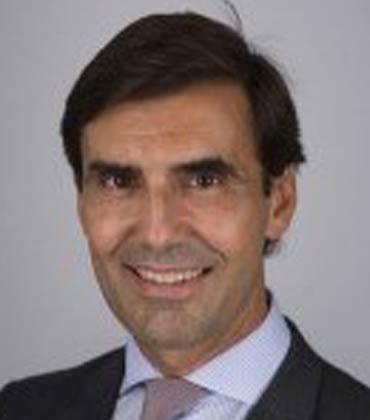
Create a Solid Practice on How to Communicate
Rui Verissimo, Business Transformation Office – Project Lead, Honda Motor

Democratic Strategy
Antony Jolley, Senior Director of Strategic Planning and Business Development, Konecranes [HEL: KCR]
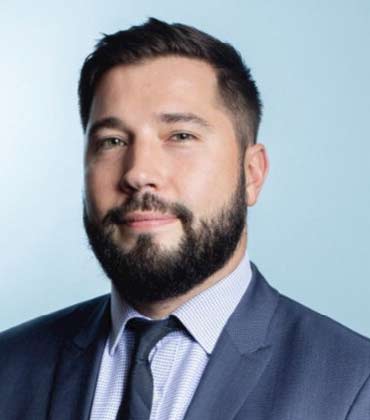
Upcoming Changes in Franchise and Management Services
German Milavin-Crone, Director of Franchise Services Platform, Louvre Hotels Group
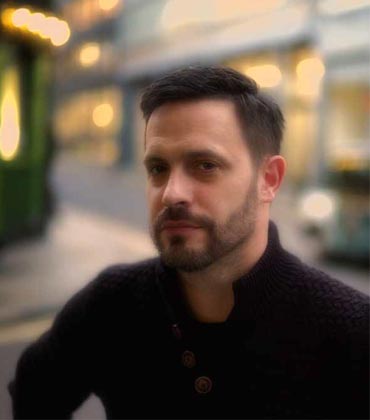
Forgetting Everything: The Trick to Successful International Expansion
Brian Gregory, Senior International Franchise Development Manager, CEX LTD
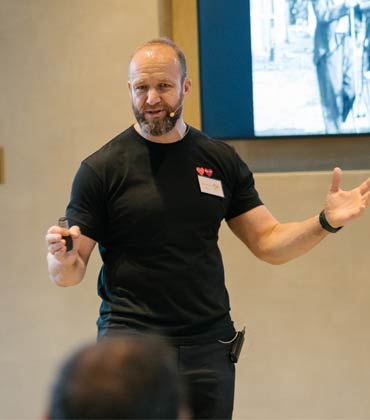
Boosting Franchise Growth with Resilient Strategies
Martin Dluhos, Global Director of Franchise Development, Le Pain Quotidien
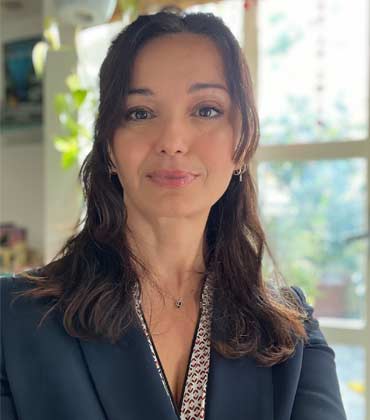
Guide for Aspiring Franchisees: Tips and Advice
Barbara Maccarrone, Marketing and Franchise Recruiting Manager - Lead Generation Manager B2B and B2C, Mail Boxes Etc. Italy

Driving Employee Success Through Training, Development and Smart Recruitment
Katia Collarile, Head of Training, Recruiting and Development, Elior Italia
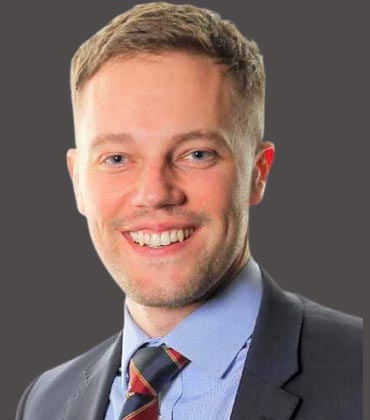
A Decade Of Change In Recruitment: What I've Learned And Where We're Heading
Will Hargreaves, Recruitment Operations Manager, Arnold Clark
IN FOCUS
Building a Flexible IT Business Strategy for Success in the European Market
Creating an IT business strategy is crucial for companies to synchronise their technology assets with their strategic aims.
Driving Efficiency and Innovation with Data in European Businesses
Data-Driven Decision Making (DDDM) is transforming European industries by enhancing operational efficiency, fostering innovation, and mitigating risks. Embracing a data-driven culture ensures sustainable growth, informed strategies, and resilience in an increasingly competitive and digitised.
EDITORIAL
Purpose, Pace and People Define the New Era
Across Europe, the rules of business management are shifting. Growth now depends less on scale and more on adaptability. Leadership is judged not by quarterly results but by long-term vision, digital readiness and the ability to build teams that thrive in constant change. The pressure is real. Economic uncertainty, climate goals, geopolitical instability and rapid tech advancement are converging. European businesses are no longer managing change; they are operating inside it. This has led to a sharp focus on smarter decision-making, faster execution and more meaningful leadership. Digital transformation has moved past experimentation. European companies are embedding AI, automation and real-time analytics into core operations, not just to boost efficiency but to stay relevant. The challenge now is managing the change it brings across cultures, processes and people. Meanwhile, leadership expectations are evolving. ESG is no longer a reporting exercise; it shapes investor confidence, customer trust and regulatory standing. Business leaders are being held to account for how well they align profit with impact. Those who fail to take a clear stance risk falling behind. Workforce priorities are also changing fast. Employees want flexibility, clarity and purpose. Managing talent today means creating an environment that supports autonomy, encourages continuous learning and adapts to new ways of working. Businesses that treat people as central to transformation are building stronger foundations for the future. What is clear is that there is no going back to the old models. Business management in Europe is being redefined in real-time. The companies setting the pace are those that act fast, communicate clearly and lead with intent. In a climate where everything is in flux, clarity and momentum are the new competitive advantages. In this edition of Business Management Review, we explore how European businesses are rewriting the rules of management by embracing rapid innovation, leading with purpose and building agile teams that can navigate ongoing disruption and deliver sustained impact. The magazine features insights from expert CXOs like Hilde R. Sønnichsen, CHRO/HR Director, Uhrenholt and Giovanni Cataldi, Head of Legal, Tax Planning and International Taxation, Natuzzi [NYSE: NTZ], who offer their opinions on the currently used business practices. We hope these valuable insights from industry leaders and solutions and services from firms featured in this edition will assist you in making informed decisions for your businesses. Let us know your thoughts!

However, if you would like to share the information in this article, you may use the link below:
https://www.businessmanagementrevieweurope.com/edition/july-august-2025-11.html



